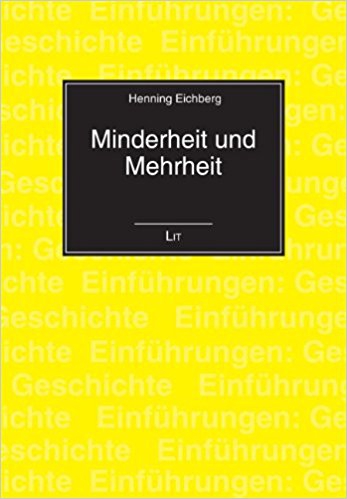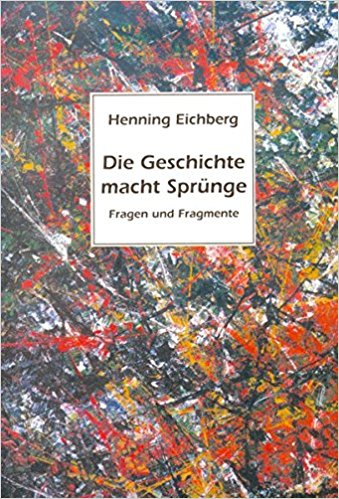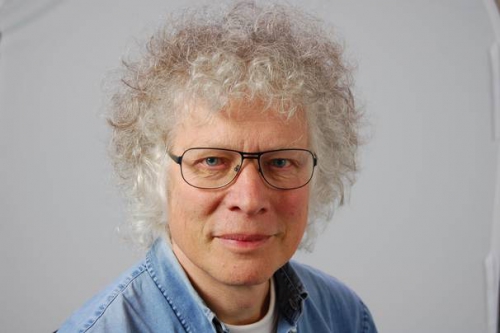“Wer trägt die schwarze Fahne heut’ durch die gespalt’ne Nation?
Who carries the black flag today in the divided nation?
Wer sprengt die Ketten, wer haut darein und kämpft für die Revolution?
Who breaks the chains, who strikes forward and struggles for the revolution?
Bist du dabei, bin ich dabei, heut’ oder morgen schon?
Do you, do I, today or maybe tomorrow?
Wann stürzt im Lande die Fremdherrschaft vor der deutschen Revolution?
When will foreign domination in this country fall before the blows of the German revolution?
Hervor, Leute, hervor – hervor!
Onward, lads, onward – onward!
Die schwarze Fahne empor!
Hold high the black flag!
Denn überall wo das Unrecht herrscht, geht die Fahne der Freiheit empor!
Everywhere where unrighteousness rules, raise high the flag of freedom!”
Every nationalist militant knew the words of this third stanza of the song: it was the unofficial anthem of the entire movement, so to speak. Henning Eichberg, who composed its text, was the principal thinker of the German national-revolutionary movement in West Germany, during the 60s and 70s. This theorist ended up emigrating to Denmark to become a member of the Socialistisk Folkeparti (Socialist People’s Party). At the end of his life, one could say that he belonged entirely to the political left of his new country. Despite this astonishing transition in the political landscape of Germany and Scandinavia, the key concepts of the “Nation” and “People” (“Nation” and “Volk”) remained cornerstones of his scientific and political interests.

These two key concepts came directly from his idiosyncratic past, his biographical itinerary. Henning Eichberg was born on December 1st 1942 in Schweidnitz in Silesia. His family left the region before the end of the war and settled in Saxony. Even when Eichberg began his political mutation and fully and entirely became a man of the left, he never stopped considering himself as a Silesian, as he recalls elsewhere in an interview accorded to the magazine Ökologie in 1998: “At the start of the project of modernity, peoples rose and sought to make themselves subjects of history, they marched in the name of liberty, equality, and fraternity … but this third value was forgotten: precisely, brotherhood, sisterhood, the communitarian feeling, or to mark it in red letters, solidarity … That’s why we must restart the project of modernity from zero. The preceding project lead to the murder of entire peoples, ethnic cleansing. Genocide and ethnocide are diametrically opposed to fraternity. That’s why I hold onto my Silesian identity, so that it is not forgotten. Silesia will not die with the old generation. The American Indian didn’t die at Wounded Knee either.”
From Adenauer’s CDU to Pure Nationalism
In 1950, the family of the young Henning Eichberg moved to Hamburg. In a retrospective interview given in 2010, he reminded his readers that he never felt at home in West Germany. In the 1950s, the young man Eichberg sought to become involved in the Adenauer era. He joined the Christian democratic CDU and obtained the rank of reserve officer in the Bundeswehr. Yet his reflections and observations made him realize one thing: the parties of the CDU only envisioned German reunification from an entirely theoretical point of view; moreover the increasing Americanization of the country particularly disturbed him. At the start of the 1960s, Eichberg reoriented himself politically bit by bit. This labor of reflection lead him to call himself a “national revolutionary.” His character attracted attention as he produced an enormous amount of work as publicist in these years, notably writing in the magazines Nation Europa, Deutscher Studenten-Anzeiger, Deutsche National-Zeitung und Soldatenzeitung and for a very important theoretical organ despite its niche style: Junges Forum. He quite justly acquired the reputation of being the principal theorist of the national-revolutionary movement in West Germany. In a work devoted to this movement, the very attentive observer of German extra-parliamentary movements Günter Bartsch vividly describes him as the “Rudi Dutschke of the right,” in his reference work “Revolution von rechts? Ideologie und Organisation der Neuen Rechte.” Some of his texts, written under the pseudonym Hartwig Singer were truly the foundational texts of a new political theory at the time. He then had the ambition to develop a theoretical corpus for German nationalism that could stay the course and endure. This corpus must, in his opinion, answer all the great questions of the moment and enter into serious competition with the ideas proposed by the “new left.”

The Western Characteristic
Happy are those who still posses the little black books entitled Junge Kritik, which Eichberg edited at the time, today the younger people have enormous difficulty finding them even in specialized bookstores! The owners of these precious booklets can measure the quality of Eichberg’s thoughts, unequaled in Germany in the 1950s and 60s. There Eichberg raised nationalism to a very respectable theoretical level: in his proofs, he starts from the postulate of a “Western characteristic,” the origin of the psychology and mores of the peoples of Europe, from which one could also deduce the emergence of typically European / Western phenomena like technology. Eichberg sought to deploy his political efforts to keep these traits of the European psyche intact in the framework of industrial societies, which all need to renew themselves from their identitarian origins.
But even while he was becoming the principal theoretical innovator of the nationalist camp in Germany at the time, Eichberg had already branched out into certain circles of the “new left” in Hamburg, who were also fighting against imperialism, especially American imperialism. These circles were “Club Lynx” and Arie Goral’s Galerie. Though Eichberg portrayed himself as a radical anticommunist in the 1960s, that didn’t prevent him from finding many positive ideas in the emerging 68er movement, because they raised a “revolt against the establishment.” He said an authentic right would never defend this establishment. Consequently, he made the watchword of this new anarchic left his own: “Disorder is the first duty!” However at the same time, Eichberg rejected conventional “socialism” and argued for a “European socialism” which was simultaneously a modern nationalism. He then referred to the left wing of the NSDAP in the 1920s.
Another revealing discovery by Eichberg in 1966: his participation in the summer camp of the French youth who militated within the “Fédération des Etudiants Nationalistes” (FEN). He was impressed by the revolutionary determination of French militant but also their will to reconnect with the socialist and syndicalist traditions of their country. Eichberg saw a “new socialism for the Europeans of tomorrow” emerging. These years saw the emergence of the ideal of a “European Nation” among French and German nationalists.
Observers of Eichberg’s path will remark with interest that he had not entirely passed to the new left by the end of the 1960s. He had good reasons not to take the plunge. In principle, he saluted the merits of the left-wing revolt, which had shaken the political edifice of West Germany, but he also criticized the indifference the leftists displayed to the position of their own people. Eichberg thought that that leftist students militated in “diversions” when they rose up for Mao’s China or Ho Chi Minh’s Vietnam instead of fighting firstly or at least simultaneously for the reunification of Germany, itself an emblematic victim of Soviet and American imperialism. Eichberg deplored the fact that the left wing opposition didn’t harmonize its struggle for the liberation of Vietnam with the struggle for the liberation of Germany. So at first Eichberg retained his basic opinions: create a “new right” in parallel (and not necessarily in opposition) to the “new left” but a new right where militants must be both “nationalists” and “socialists,” as Günter Bartsch recounts in the book I just mentioned. Thus Eichberg held his distance in the 1960s and 70s.

The Magazine “Wir Selbst” as a new tribune for Eichberg
Among the mythic actions that one mentions regarding Eichberg in the framework of his “new right,” there is a protest against the conferences held by Willy Brandt with the DDR’s Prime Minister Willi Stroph in Kassel in 1970. The group assembled by Eichberg distributed tracts entitled: “The division of Germany is the division of the German proletariat.” Two years later, Eichberg drafted the founding program of a movement, Aktion Neue Rechte, whose first principle would be “the nationalism of liberation” (Befreiungsnationalismus). This “nationalism of liberation” would spread in a Europe and a world divided into two blocs, one communist, the other capitalist. This incapacitating and humiliating division thus demanded the German people’s unconditional solidarity with the combat of all ethnic minorities within states, with all the peoples deprived of their national sovereignty by the American and Soviet superpowers, also victims of this duopoly. In 1974, the militants around Eichberg founded Sache des Volkes/ Nationalrevolutionäre Aufbauorganisation (Cause of the People/National Revolutionary Construction Organization – SdV/NRAO). Eichberg clearly intended to pursue one goal: encourage the political left to take the national question into consideration. Starting from this moment, he was a persona grata in certain circles of the left. He could publish his articles in some of their organs like Pflasterstrand, das da and Ästhetik & Kommunikation. He participated in the inaugural congress of the Green Party in 1979 in Baden – Wurttemberg. He then cultivated the hope of seeing a “third way” emerge from the ecological movement, distant from the fixed ideas of the right and left. But alas, he rapidly had to note that it was an error: henceforth, he would consider the Green Party as a new bourgeois party.
Eichberg was fascinated by Rudi Dutschke’s evolution. In his last years and especially before his death, the late leader of the Berlin student protesters increasingly emphasized the idea of German national self-determination in his political thought. In 1979, Siegfried Bublies founded the magazine Wir Selbst, with a national-revolutionary inspiration as Eichberg intended. Bublies had been a permanent fixture of the “Young National Democrats” in Rhineland – Palatinate. This well organized organ would become Eichberg’s principal tribune from where he would spread his non-conformist ideas.
In this magazine, Eichberg could display his always innovative ideas, which challenged and provoked but also forced the reader to reflect, to review his unrefined convictions. Eichberg’s thought was a thought in motion, nothing frozen in immobile concepts. He didn’t affirm a concept of “nation,” but he sought, with his readers, to define something organic and living: national identity. He probed every approach to re-root the people despite the deracinating context of late capitalist industrial society, in order to relieve the loss of countries and regions under the blows of globalization and Americanization.
Ultimately, Eichberg gave up seeking to influence the German political scene. In 1982, he definitively emigrated to Denmark where he received a professorship at the university of Odense. In his Danish exile, he clearly broke more and more with right wing milieus. Much later, his former disciples would learn with stupefaction that he argued for a multicultural society in his own way. From his Danish professorship, Eichberg would acquire an international scientific renown. He became specialist in “body culture” and sport. All that was distant from the theories he professed in the columns of Wir Selbst or Volkslust. His theories on sport and body culture are very interesting but their very acute scientific character obviously doesn’t electrify militants like the innovative and pioneering texts of the national-revolutionary faction he boldly drafted in the 1960s, 70s, and 80s.
Henning Eichberg passed away in Odense in Denmark on April 22nd, 2017.
Wer trägt die schwarze Fahne
1. Wer trägt die schwarze Fahne dort durch Schleswig und Holsteiner Land?
Das sind die Bauern, das ist Claus Heim, der trägt sie in der Hand.
Sie pfändeten ihnen die Höfe weg, da bombten sie die Behörden entzwei.
Im Jahr achtundzwanzig erhoben sie sich gegen Zinsdruck und Ausbeuterei.
/ : Hervor, Leute hervor, hervor! Die schwarze Fahne empor! Denn überall,
wo das Unrecht herrscht, geht die schwarze Fahne empor.
(Who carries the black flag in the lands of Schleswig and Holstein?
It’s the peasants, Claus Heim carries it in hand.
Their farms mortgaged and taken, they blew up the government agencies!
In the year of 28, they rose against interest and exploitation)
2. Wer trägt die schwarze Fahne dort durch das Westfalenland?
Das ist der Kumpel von der Ruhr, er trägt sie in der Hand.
Sie schlossen ihnen die Zechen zu, das war das letzte mal;
im Jahr sechsundsechzig erhoben sie sich gegen Bonn und das Kapital.
/ : Hervor, Leute hervor, hervor! Die schwarze Fahne empor! Denn überall,
wo das Unrecht herrscht, geht die schwarze Fahne empor.
(Who carries the black flag in the land of Westphalia?
It’s the coal-miner of the Ruhr, he carries it in hand.
They’ve closed his mines, it’s the last time;
In the year of 66 they rose against Bonn and Capital.)
3. Wer trägt die schwarze Fahne heut` durch die gespalt`ne Nation?
Wer sprengt die Ketten, wer haut darein und kämpft für die Revolution?
Bist du dabei, bin ich dabei, heut` oder morgen schon?
Wann stürzt im Land die Fremdherrschaft vor der deutschen Revolution?
/ : Hervor, Leute hervor, hervor! Die schwarze Fahne empor! Denn überall,
wo das Unrecht herrscht, geht die Fahne der Freiheit empor.
Source: http://euro-synergies.hautetfort.com/archive/2017/08/17/h...





 del.icio.us
del.icio.us
 Digg
Digg
Les commentaires sont fermés.